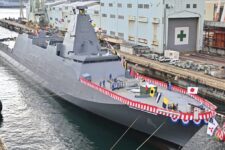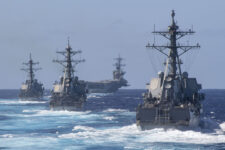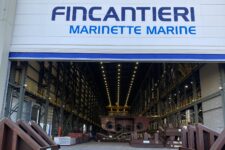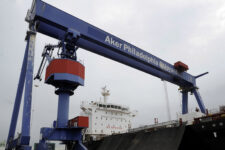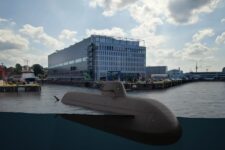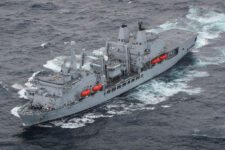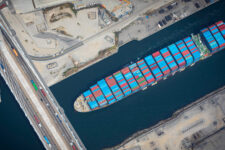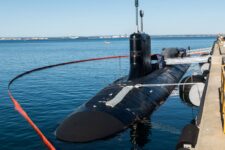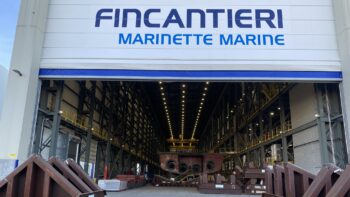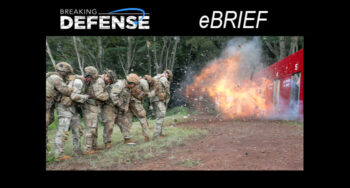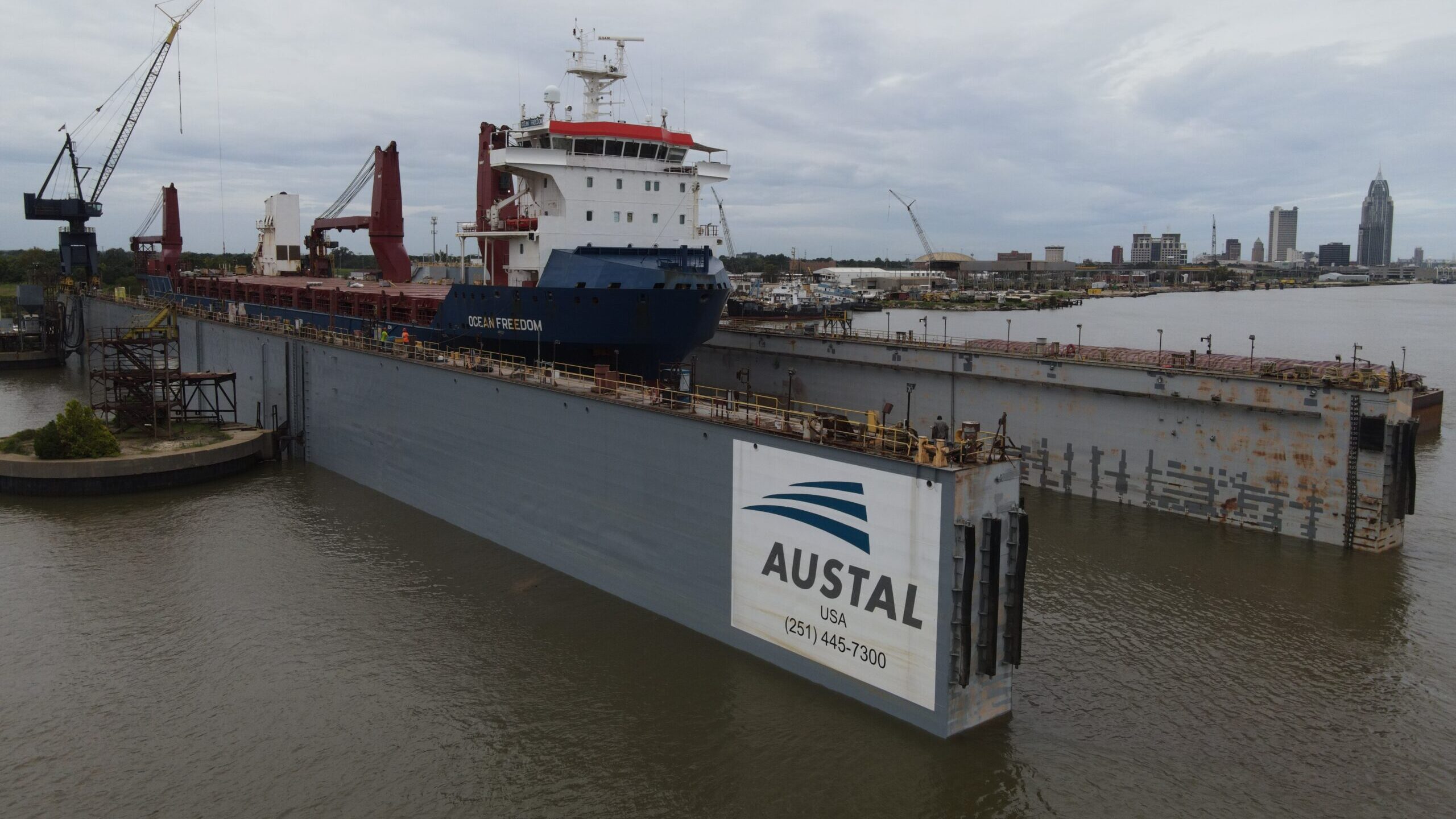
A commercial ship in the dry dock at Austal USA’s new West Campus. (Photo provided by Austal USA.)
This report was updated at 9:15 a.m. ET on Oct. 6 to reflect the first contract the Navy awarded Austal USA to build a steel ship.
WASHINGTON: Rusty Murdaugh, Austal USA’s new president, says that post-Littoral Combat Ship the company will undergo a two-fold strategic evolution: building up its new ship repair business anchored by its second campus and a shift to conventional steel-based shipbuilding.
“We didn’t just start out with [Expeditionary Fast Transports] and [Littoral Combat Ships]. Our heritage comes from doing unique ships that meet the special needs of our customers,” Murdaugh told Breaking Defense in his first interview since formally being named president. “And so, the journey is just continuing for us over that 20-year period and evolving.”
Despite limited facilities compared to some competitors, Austal USA, the American arm of the Australian shipbuilding company, has become a staple prime contractor for the US Navy, making its name synonymous with the Independence-class LCS and the Spearhead-class EPF. But those programs — and more importantly the contracts they once brought in — are fading.
In the interview Murdaugh laid out where he sees the shipbuilder’s future. He is not stepping into the role blind, having been CFO since 2017, but he is tasked with bringing Austal through a distinct evolution that will define its place in the Navy’s shipbuilding base for the foreseeable future.
Murdaugh also comes to the permanent role following a tumultuous time for the company’s leadership. He was named acting president after the former president, Craig Perciavalle, resigned in February following a Justice Department investigation found the company’s “internally generated cost estimates understated the full costs to construct” the Independence-class LCS, according to an Austal statement. The investigation also found certain valves on the ship did not meet some of the required military specifications; the Navy and Austal modified the contract and the valves were ultimately accepted as built.

Rusty Murdaugh. (Photo provided by Austal USA.)
At the center of the evolution is the Austal West campus, a 15-acre waterfront property including a certified dry dock and 100,000 square feet for production facilities, which the company bought in September 2020.
The acquisition is meeting multiple strategic needs, the company president explained. The first is that it included an active ship repair yard that had already been servicing the local community. Murdaugh said Austal made offers to most of the yard’s pre-existing workforce and kept operations moving starting the day after the deal was signed.
“By taking over that labor, when we weren’t doing work on new ships, we were preparing the [668-ft.] dry dock that we acquired and making improvements,” he said.
Murdaugh estimated about 20% of Austal’s revenue now comes from the ship repair business and, if he has it his way, that number will grow closer to 50%, bringing in somewhere between $1 and $1.5 billion, balanced by a similarly sized new construction portfolio.
The new campus also allows for the company to launch its own ships and has access to additional waterfront space for new projects moving forward. The infrastructure investment has already started paying dividends in the form of an LCS maintenance and modernization contract. But that is far from coincidence, and, in fact, the Pentagon last year moved to help Austal steady itself in the face of the pandemic.
In June 2020, the Defense Department announced it would provide the company with $50 million through the Defense Production Act to “maintain, protect, and expand critical domestic shipbuilding and maintenance capacity.”
“These investments will have long-term benefits for U.S. Navy shipbuilding while accelerating pandemic recovery efforts in the Gulf Coast region,” the DoD said. Austal matched that sum with its own $50 million investment, USNI reported.Three months later, the company purchased its second campus.
For years, there had been speculation among Navy observers about what Austal will do to keep itself afloat once new construction for the Independence class ended. The company has seen sporadic work on the EPFs, but that program has not provided anywhere near the consistent stream of contracts LCS did.
The answer has come in the form of a coordinated effort to bring steel shipbuilding facilities online, a move Murdaugh said the Navy supports Austal taking.
During the interview, he was clear eyed about what prompted the decision. “The kick for us [to push for steel] was when we weren’t able to secure the frigate design. We re-evaluated where we needed to go as an organization and probably late last year or early this year is when the full commitment started to go forward to steel,” he said.
Murdaugh said the company set itself a deadline to have steel shipbuilding capabilities ready by March 31, 2022 and hinted at new contract awards in the coming weeks that will keep those facilities busy.
“We’ll use the month of April to go ahead and do new construction of test equipment and facilities and people, and hopefully in the next week or two, we’ll be able to announce the official award of a couple steel ships that will go down that line for the first time,” he said.
Subsequent to this article’s original publication, the Navy announced it is awarding Austal USA a $144 million contract for two Towing, Salvage and Rescue Ships, the first steel vessels the company will build for the service. The Navy previously awarded Austal a $3.6 million contract for the T-ATS’ functional design in June.
Some of the other programs the company has publicly stated it’s pursuing for contracts include the Coast Guard’s Offshore Patrol Cutter, the Navy’s Light Amphibious Warship and the Next Generation Logistics Ship. Murdaugh added the company is also eyeing non-combatant ship work with Military Sealift Command.
Craig Hooper, a former Austal executive, predicted in an April 2020 article for Forbes that either Fincantieri Marinette Marine or his former employer would win the FFG(X) competition.
One of his reasons the Navy might favor Austal, he said, was largely to do with the potential disaster of a prime American shipbuilder having an empty ordering book.
“[W]ithout an additional frigate contract, Austal’s future in the U.S. looks bleak—the yard would probably shutter, or, at best, dwindle to a shadow of its current size… and forcing a transformation to a conventional steel-based shipyard to bid for more ‘conventional’ Navy or Coast Guard ships would be difficult,” Hooper wrote.
With Fincantieri busy on the frigate’s design, Hooper’s prediction about Austal needing to make a play for steel shipbuilding has come true.
The terror of war, a helo crash mystery and the business of defense: 5 Middle East stories from 2024
From eye-witness accounts of the Israeli invasion of Lebanon to a rare appearance of Iranian weapons at a foreign arms expo, there’s a selection of Breaking Defense’s Middle East coverage.

